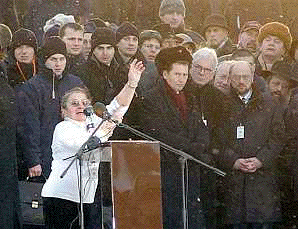Polish
President Cites Survivor at Knesset
Greer Fay
Cashman,
THE JERUSALEM POST
March 17, 2005
One
of the greatest compliments that Miriam Yahav may have
received in her life was delivered by Polish President
Aleksander Kwasniewski when he stood up at a state dinner
hosted by President Moshe Katsav in the Knesset Tuesday
night and quoted what she had said in her spontaneous
outburst at Birkenau at the end of January of this
year.
|

|
|
|
Miriam
Yahav (previously Merka Szevach) shows her
tattoo with her Auschwitz inmate number as she
delivers a speech in front of the memorial in
the former Nazi concentration camp of
Auschwitz-Birkenau.
[Photo: AP]
|
|
Referring to her by her maiden name, Merka Szewach, and
commending her excellent Polish, Kwasniewski repeated her
protest.
The Nazis took away
her name and gave her a number. She was no longer Merka
Szewach. "What right did they have to kill my family?
What right did they have to kill my people?" she had
asked at the commemoration of the 60th anniversary of the
liberation of Auschwitz. "Why? Why did they do that, and
why did they burn my whole family here?"
Kwasniewski was
full of admiration for the 78-year-old Beersheba
great-grandmother who had then declared: "I am happy as a
survivor because I can live as a citizen in my country,
Israel, where I have an army and a president." He cited
her as an example of Israel's remarkable history of
tragedy, struggle and heroism. "We are honored to be
guests in the independent, democratic, vibrant State of
Israel," he said.
Contacted by The
Jerusalem Post to get her reaction to being cited by the
president of Poland, Yahav was amazed and delighted. The
sole survivor of her family, she had sworn after the war
and after the pogroms that followed the war that she
would never set foot in Poland again.
But a little less
than 20 years ago, she had woken in a cold sweat from a
nightmare in which she had resisted jackboot-wearing
Nazis, and told her husband that she had to return to
Poland. He would not allow her to go alone and
accompanied her along with their two
daughters.
Yahav had written
books and poems about her experiences. Although she had
spoken Hebrew since childhood, her spelling was poor and
her daughters had corrected the manuscripts.
When they arrived
at her block in Auschwitz and saw the conditions under
which she had lived, her daughters burst into tears.
"They had never understood my suffering. They had only
corrected my Hebrew. What I had written had not
penetrated."
Yahav, whose family
lived for centuries in the Polish city of Bialystock
after having been expelled from Spain during the Spanish
Inquisition, immediately made up her mind to take youth
groups to Poland so that they would understand what the
generation of the Holocaust endured.
Before being sent
to Auschwitz, she had been an inmate in Treblinka,
Majdanek and other camps and could talk about the
atrocities she had witnessed in all of them. She now
shares these memories with youth groups that she
accompanies to Poland - traveling to the land of her
painful past as often as six times a year.
"I'm two people in
one body," she said Wednesday. "I'm working for the
future. I was only 12 years old when the war broke out.
They took my roots. They left me with no one. Now I have
ten grandchildren and a great grandchild - but I am still
alone. I cannot forget. I cannot allow anyone else to
forget. The last thing my mother said to me was: 'Merka,
you go. Perhaps you'll survive and tell the world what
happened...'"
That's what she
intends to do for as long as she has breath.
.